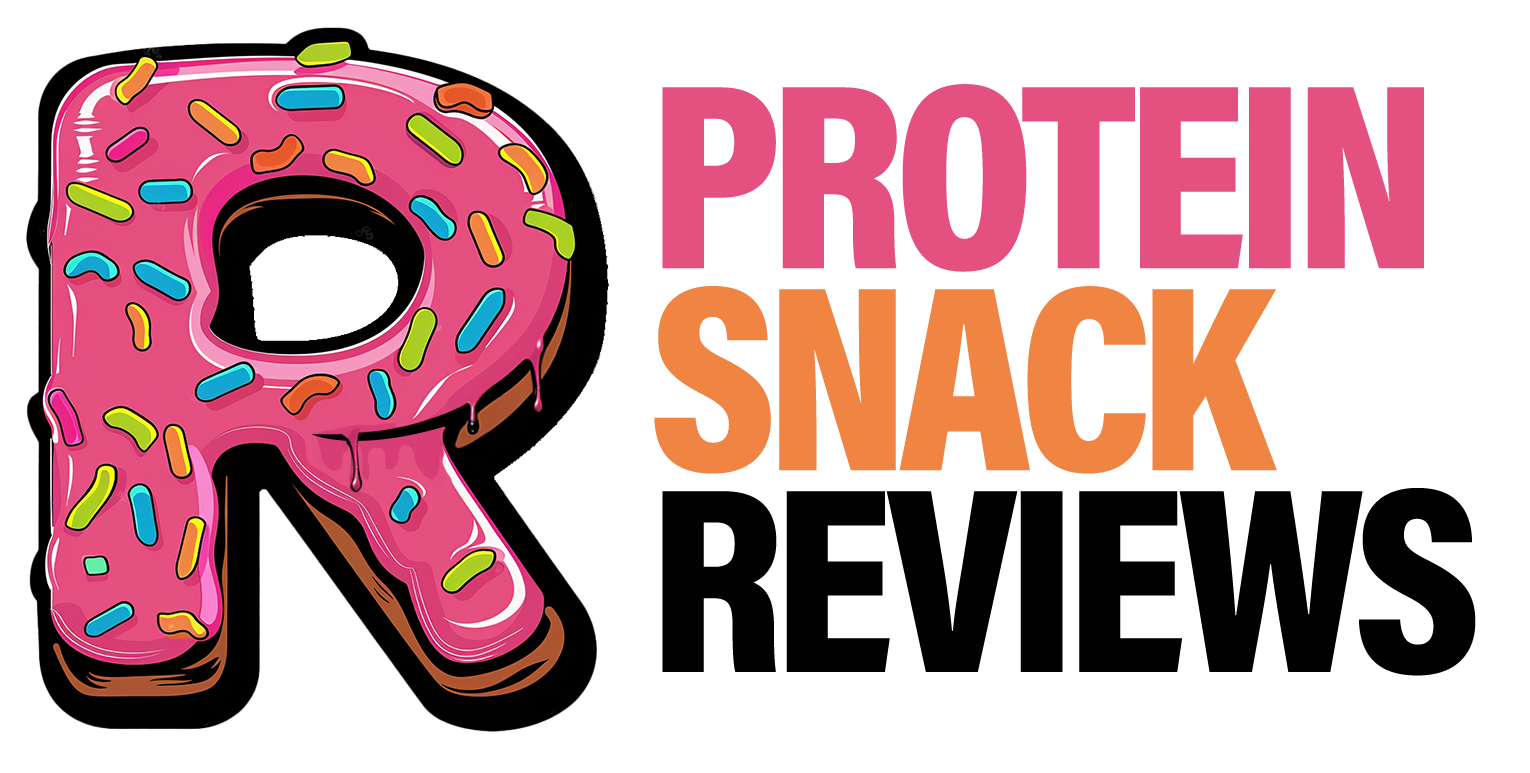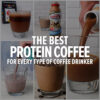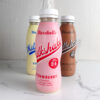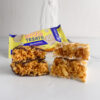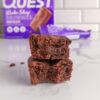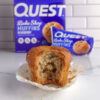As a Dad, I truly believe that good nutrition is the key to helping our kids grow up strong and healthy.
And one of the most important parts of that nutrition is protein. Protein is like the building block of our bodies, helping our kids’ muscles to grow, supporting their immune systems, and keeping them in good health overall.
However, I know how tricky it can be to make sure our kids are getting enough protein.
Between school, sports, playtime, and picky eating, sometimes it’s hard to make sure they’re getting enough protein from their meals alone.
This is where protein shakes and powders can come in handy.
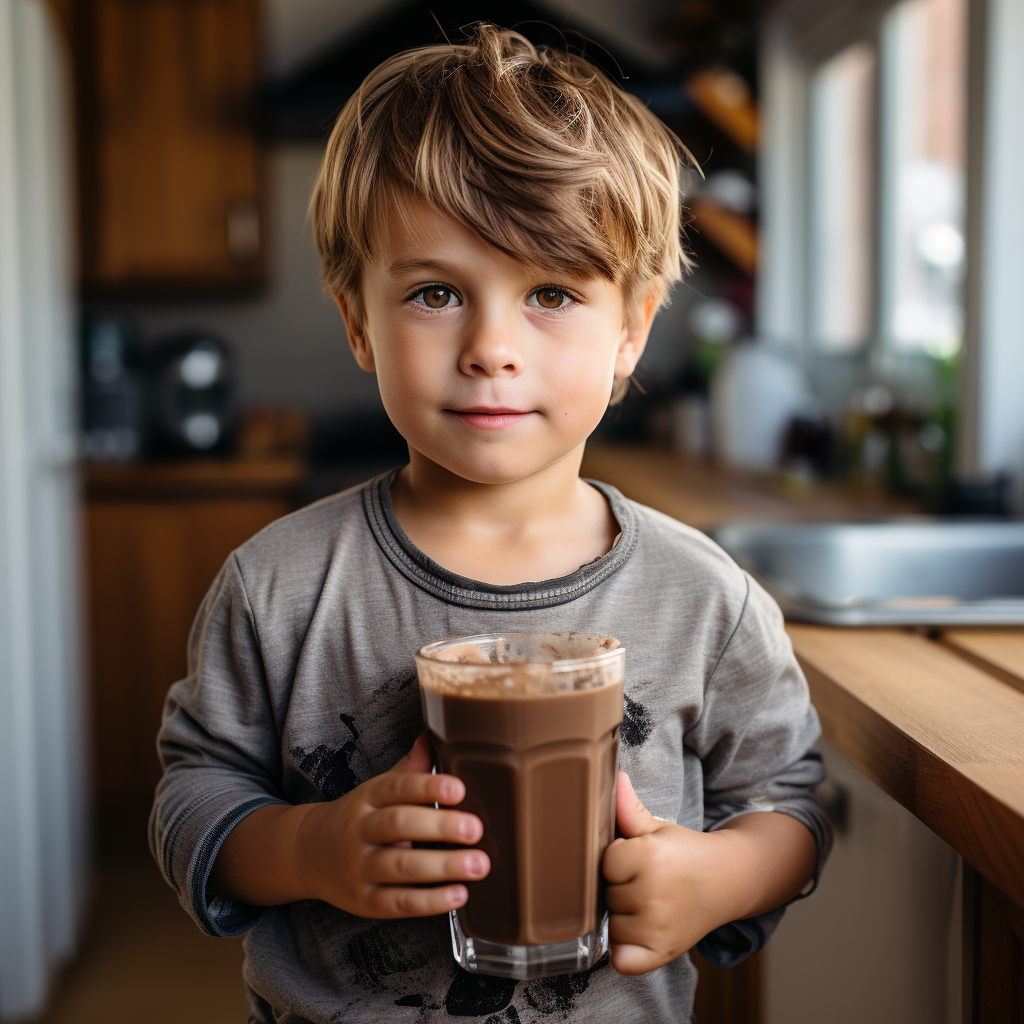
Protein shakes and powders can be a simple and effective way to boost our kids’ daily protein intake. They come in a range of yummy flavors that kids love and can be easily mixed into meals or snacks, or even just drunk on their own.
These shakes and powders aren’t meant to replace meals, but rather add to them, filling in any nutritional gaps and making sure our kids are getting everything they need to grow and develop properly.
But with so many options out there, the tricky part can be choosing the right protein shake or powder.
It can be really overwhelming. But don’t worry, I’m here to help.
I’ve carefully looked at a bunch of different options and have put together a list of the top 15 protein shakes and powders for kids for 2024.
And since not all kids are the same, I made sure to include a variety of options.
So whether your child prefers dairy-based or plant-based products, or if they like to drink their protein as a shake or prefer it as a powder to mix into their favorite foods, I’ve got you covered.
Why Kids Need Protein (and How Much They Need)
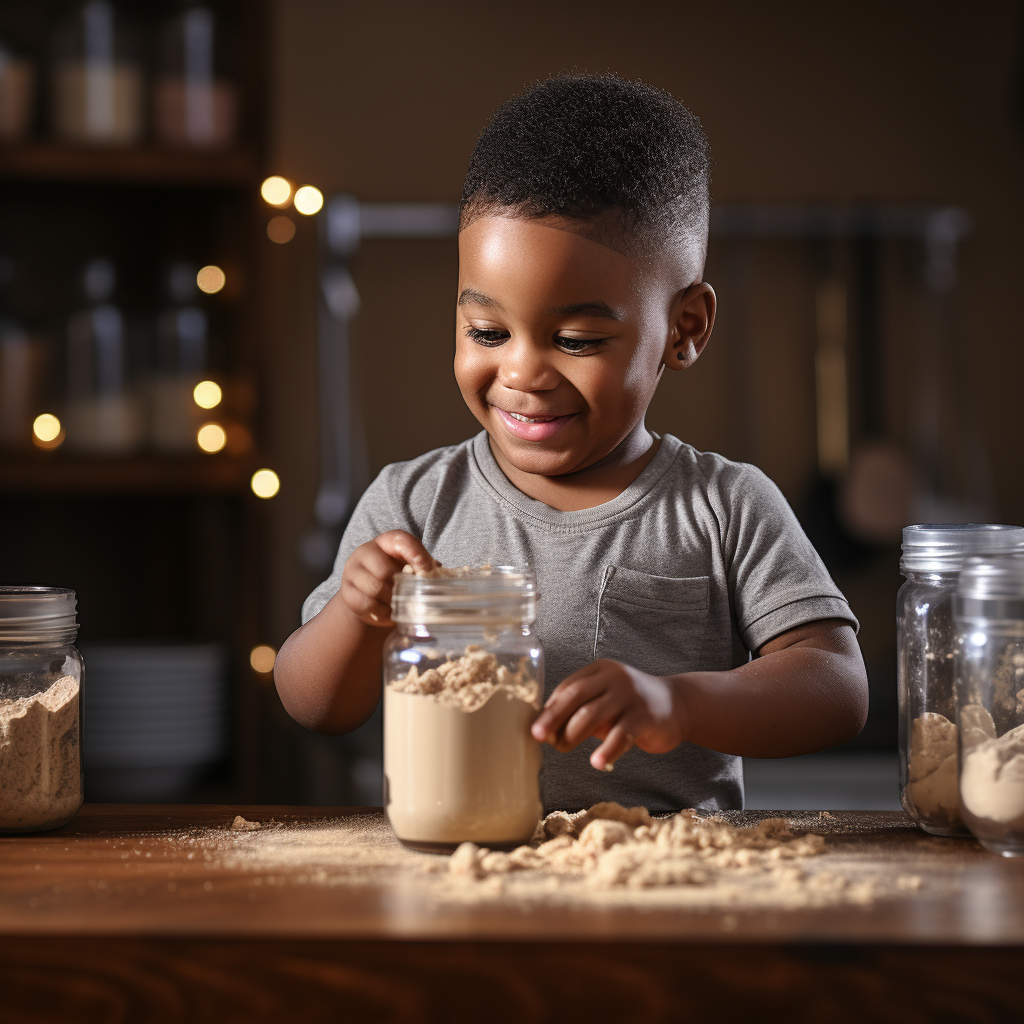
Protein is important for every diet, but children’s diets are a bit different than ours. Why is protein important for kids, and how much do they actually need?
Protein is like the body’s building material. It’s needed to create and repair all sorts of things in the body – everything from muscles and bones to skin and hair.
Plus, it plays a crucial role in creating hormones and enzymes, which help the body function properly. Not to mention, it’s essential for our immune system too.
Since kids are still growing and developing, they need a good amount of protein to help support that growth.
So, how much protein do kids need? The answer depends on their age. According to the Institute of Medicine of the National Academies, here are the recommended levels:
- For children ages 1-3 years, protein should make up between 5% and 20% of their total energy intake, which equals about 13g of protein daily.
- For children ages 4-8 years, protein should make up between 10% and 30% of their total energy intake, which works out to around 19g of protein daily.
- For children ages 9-13 years, protein should make up between 10% and 30% of their total energy intake, translating to about 34g of protein daily.
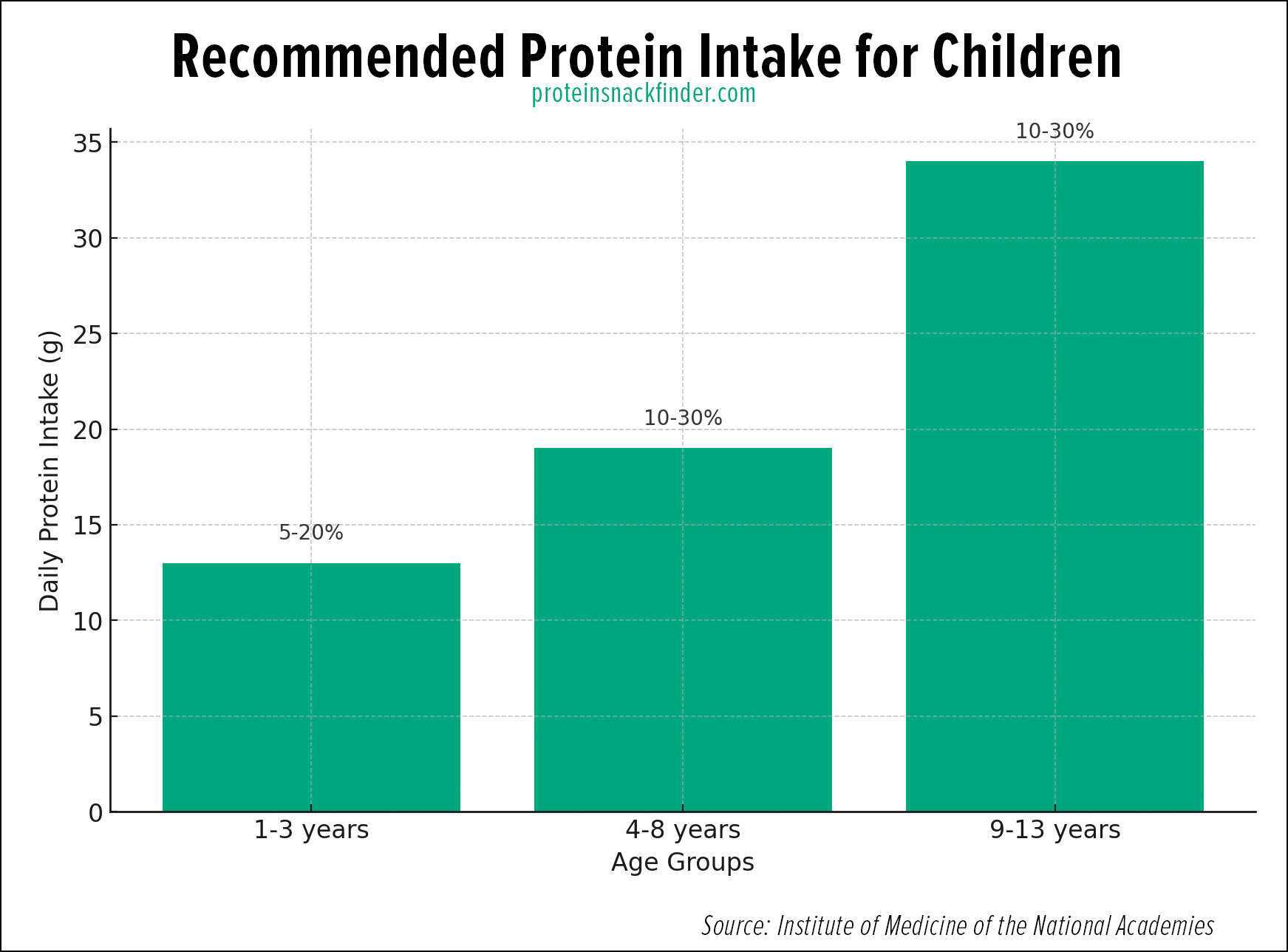
Remember, these are just guidelines and every child is different. Some kids may need a bit more or less, depending on factors like their size, activity level, and overall health.
You can see that these recommendations are vastly different from that of adults. A lot of adults (myself included) consume up to 1g of protein per pound of bodyweight, which is obviously way more than the 34g listed above for preteens.
And of course, some days your child will consume much more protein than this, which is totally okay. If you think through their diets, some foods are naturally very high in protein.
For example, if you serve up grilled chicken for dinner, there’s a strong chance that your child will be getting all of their required protein from that meal alone.
But not every day will look the same, which is why it’s crucial to ensure our children are getting enough protein every day to support their growing bodies.
And this is where protein shakes and powders can help, serving as an easy, delicious way to boost your child’s protein intake.
Choosing The Right Protein For Kids (Can They Drink Regular Protein Shakes?)

It’s a question I’ve heard a lot – can kids just have the same protein shakes meant for adults? The simple answer is usually no. Let me explain why.
Adult protein shakes are typically designed with adult nutritional needs in mind, which are quite different from those of children.
For example, while adults might grab a protein shake like Premier Protein to aid in weight loss or muscle growth, children require a much more balanced blend of nutrients for their overall development, not just protein.
Plus, some adult protein supplements may contain ingredients that aren’t suitable for kids, like certain artificial sweeteners or excessive amounts of protein. Too much protein can lead to digestive issues or even kidney problems in extreme cases.
Therefore, it’s usually safer and healthier to opt for a protein source specifically designed for kids.
When it comes to picking the right protein powder or shake for your child, there’s more to it than just looking at the protein content.
You’ll want to consider factors like the taste (because let’s face it, if it doesn’t taste good, they’re not going to drink it), the ingredients (are they natural? Are they healthy?), and the sugar content (you probably don’t want your child jumping off the walls).
Another crucial factor is whether the protein source is ‘complete’. A complete protein means it contains all of the essential amino acids – the building blocks of protein – that our bodies can’t produce on their own.
For children, especially those following a plant-based or vegan diet, finding a complete protein source can be a challenge, but it’s not impossible.
Protein shakes and powders can be a great way to supplement your child’s diet and ensure they’re getting the protein they need to grow and develop healthily. So, let’s dive in and take a look at some of the best options out there in 2024.
The 15 Best Protein Shakes & Powders for Kids in 2024
Let’s break down the top choices into two categories: plant-based protein powders and vegan protein shakes.
It’s important to note that I’m not going to rank these as we all have different preferences. Rather, I will provide you with options to make the best choice for you and your child.
The Best Plant-Based Protein Shakes & Powders for Kids
Plant-based protein powders are made from sources like peas, rice, and hemp. They can be a great option for children with dairy allergies or intolerances, or for those on a plant-based diet.
Here are the top seven plant-based protein shakes and powders for kids:
Ripple Kids Milk
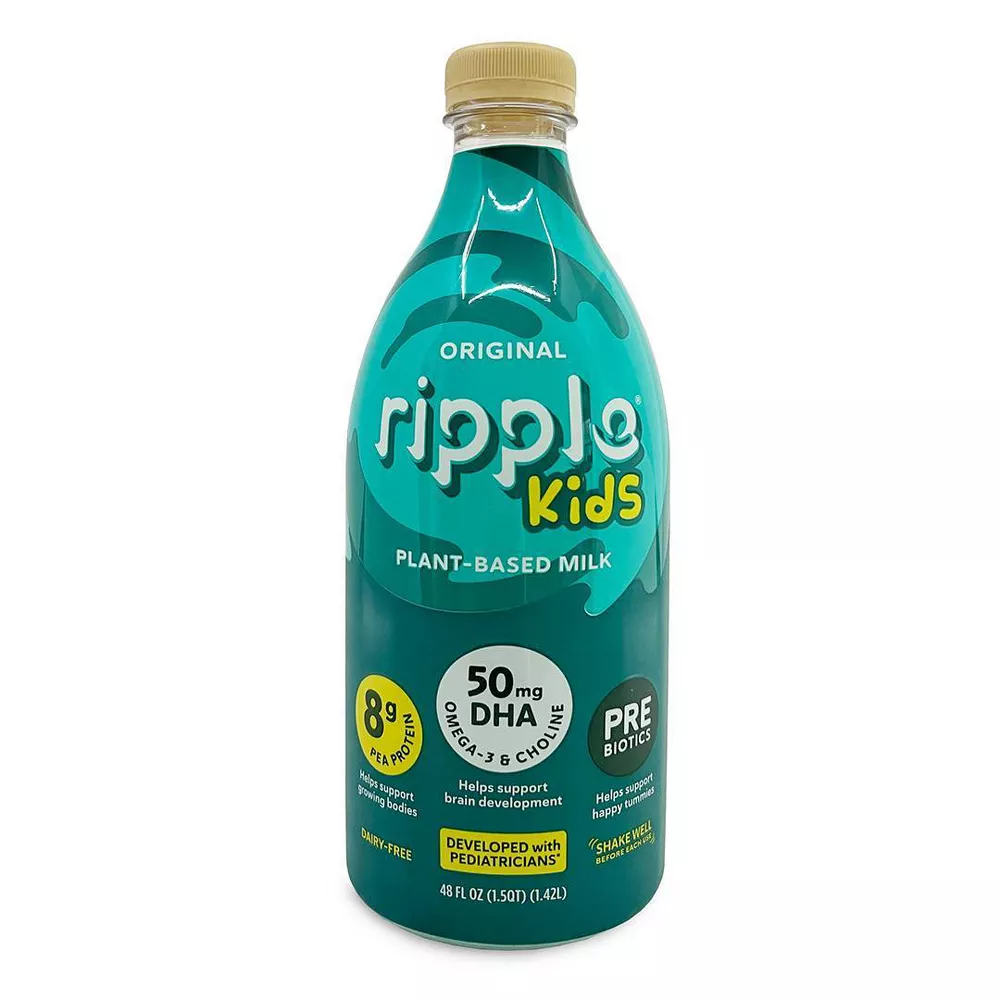
If your family or child is dairy-free, Ripple now makes it easier to get some protein into their diet. This is more than just plant-based milk, it has added nutrients specific for children.
Much like Fairlife, there are DHA Omega-3’s added to this milk to support a child’s developing brain, which is obviously extremely beneficial.
Nutrition Facts: 140 Calories, 8g Fat, 8g Carbs (5g Sugar), 8g Protein
Key Ingredients & Nutritional Highlights: Pea protein, sunflower oil, DHA Omega-3. This dairy-free milk alternative has 8g of protein per serving.
Pros and Cons: Ripple Kids Milk is a great choice for those on a vegan diet or with dairy allergies, but the taste may not be enjoyed by all children.
Orgain Kids Protein Shake
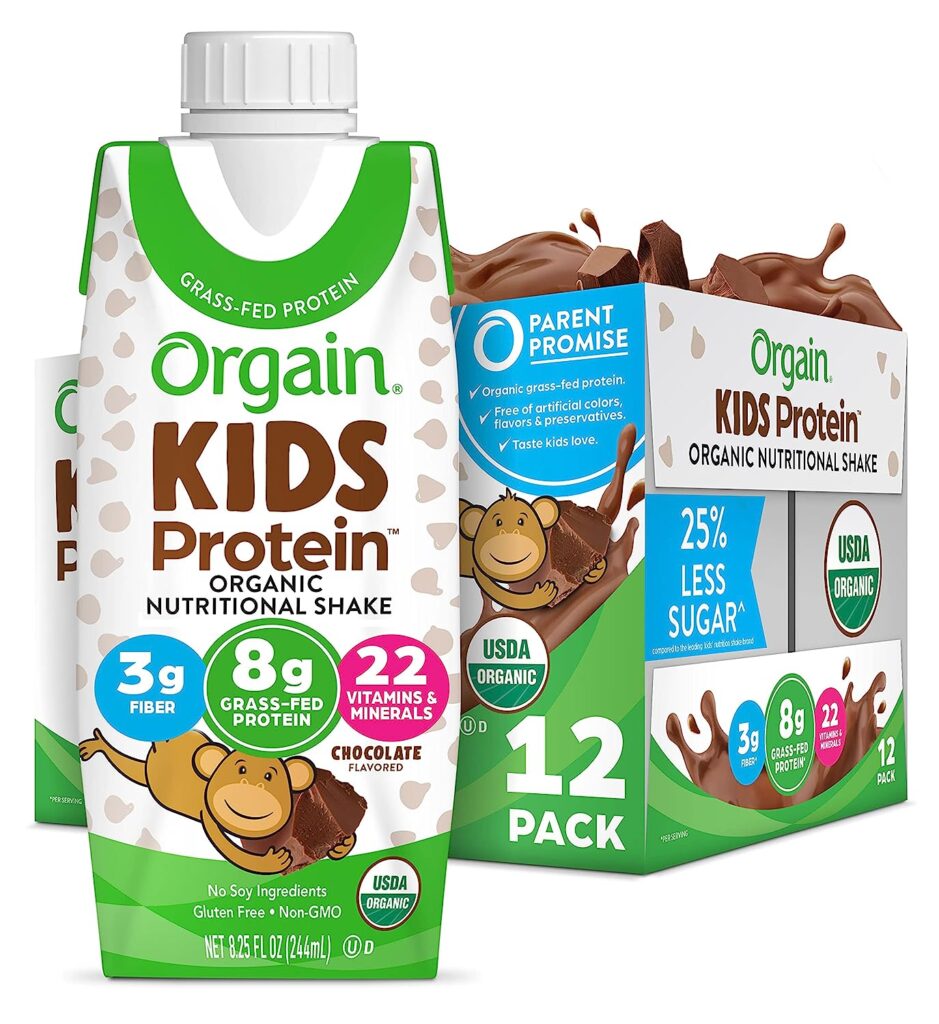
At first glance, this protein shake doesn’t look any more beneficial than regular milk from a nutrition standpoint, but there are two major differences.
One, the flavor has been developed specifically for kids, so they’re bound to enjoy the vanilla, chocolate, or strawberry.
Two, since the main ingredient is whey protein, this shake is jam-packed with tons of vitamins and minerals.
Nutrition Facts: 180 Calories, 7g Fat, 21g Carbs (9g Sugar), 8g Protein
Key Ingredients & Nutritional Highlights: Organic milk protein concentrate, organic cane sugar. Each shake delivers 8g of protein.
Pros and Cons: These shakes are organic and free of artificial colors and flavors, but some parents may prefer a lower sugar option.
Kidz Superfood Protein Powder
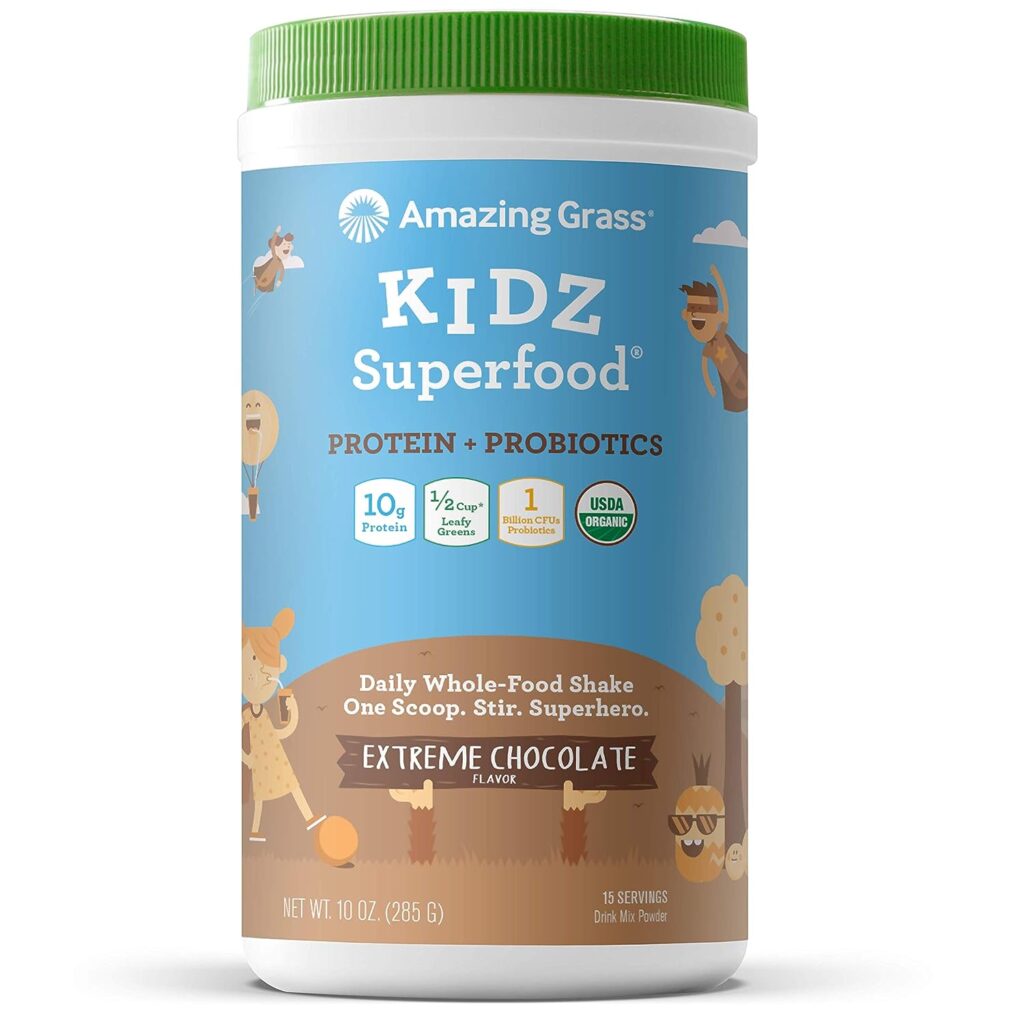
If your child needs protein and doesn’t eat enough vegetables in their life (I mean, which kids actually do) then this protein powder may be perfect.
It’s completely plant-based and organic, so it may not blow away a kid’s tastebuds quite like Nesquik, but it could be a great option for a little one who cannot handle dairy.
Plus, since it’s a powder and not a pre-made shake, you can add anything needed to make this shake fit your child’s tastebuds (like blending it into a smoothie)
Nutrition Facts: 70 Calories, 1.5g Fat, 5g Carbs (2g Sugar), 10g Protein
Key Ingredients & Nutritional Highlights: Pea protein, organic greens, 12 vitamins, and minerals. Each serving offers 10g of plant-based protein.
Pros and Cons: It’s an excellent choice for a plant-based diet and is allergen-friendly. However, some kids might not like the taste of green superfoods.
Kate Farms Pediatric
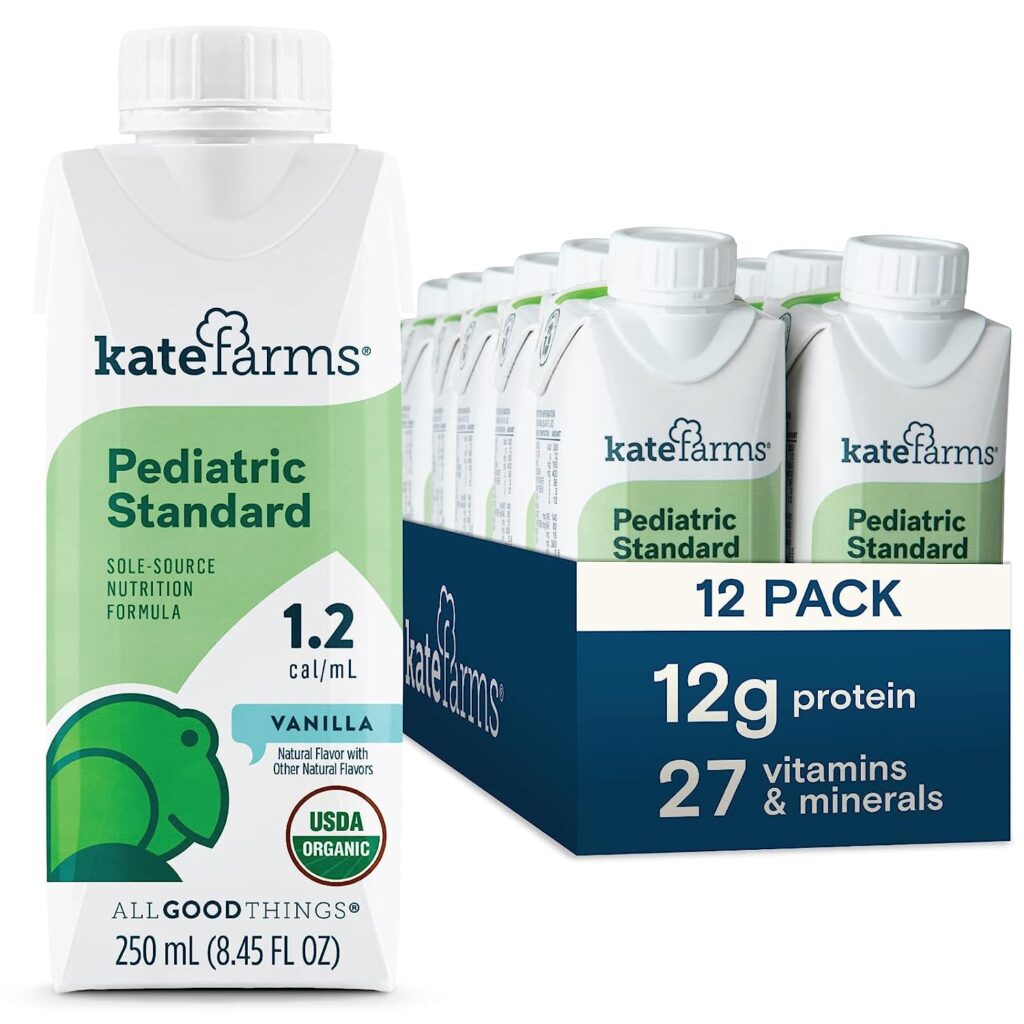
If your child needs an easily digestible option that is both vegan and organic, these pre-made shakes may be a great choice.
As far as a protein source is concerned, it may not be the greatest, but the higher calories are not necessarily a bad thing. If your child needs extra calories in their life, especially for sports purposes, then the 300 calories per shake can be really helpful.
Unfortunately, this is one of the more expensive options out there, but that’s to be expected when something is plant-based and organic.
Nutrition Facts: 300 Calories, 12g Fat, 36g Carbs (9g Sugar), 12g Protein
Key Ingredients & Nutritional Highlights: Pea protein, organic agave syrup, a blend of 29 superfoods. It delivers 16g of plant-based protein per serving.
Pros and Cons: This formula is designed to meet the nutritional needs of children with difficulty gaining weight. However, it’s a bit more expensive than some alternatives.
KinderSprout Shakes
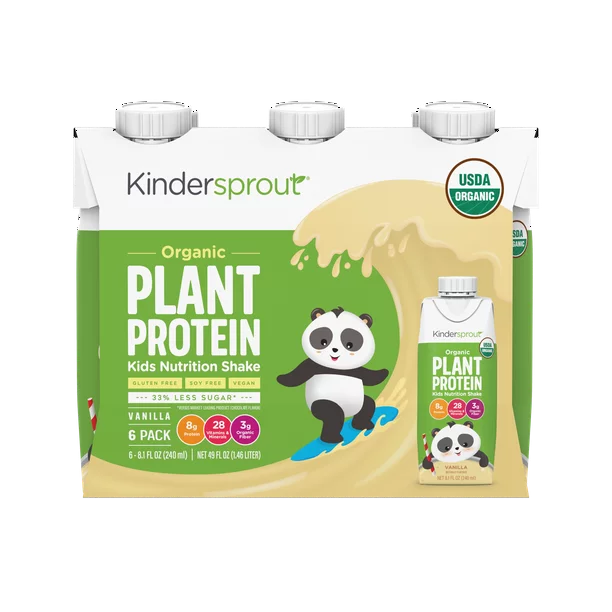
As a plant-based option, it’s great to see the huge list of vitamins and minerals included in this shake as they are very important for kids to consume.
Nutrition Facts: 200 Calories, 7g Fat, 26g Carbs (9g Sugar), 8g Protein
Key Ingredients & Nutritional Highlights: Pea protein, organic cane sugar, organic greens. Each serving contains 8g of plant-based protein.
Pros and Cons: It’s a great vegan, gluten-free, and organic option. However, it may not be as high in protein as some other options.
Safe and Fair Kids Protein Powder
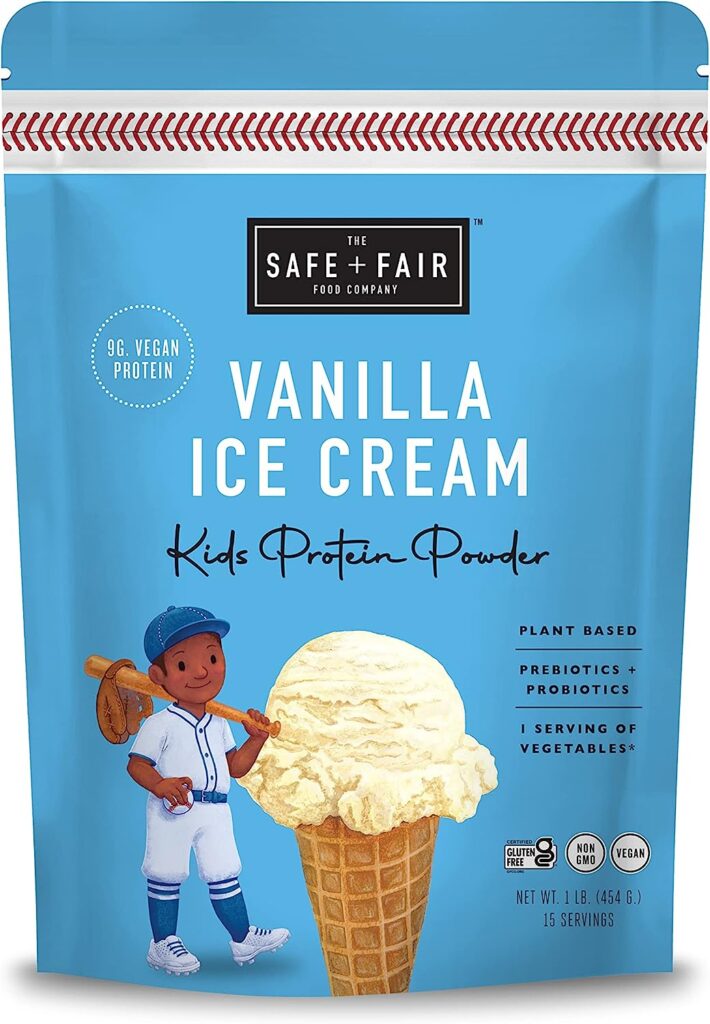
Nutrition Facts: 110 Calories, 1.5g Fat, 17g Carbs (9g Sugar), 9g Protein
Key Ingredients & Nutritional Highlights: Pea protein, fiber, prebiotics, and probiotics. Each serving delivers 10g of protein.
Pros and Cons: It’s free from the top 9 allergens and packed with fiber and gut-friendly prebiotics and probiotics, but some kids may prefer a less plant-heavy flavor.
The Best Dairy-Based Protein Shakes & Powders for Kids
If your child doesn’t have any dietary restrictions, dairy products are a very good choice for protein drinks. Here are some of the best options available right now.
Horizon Organic Whole Milk
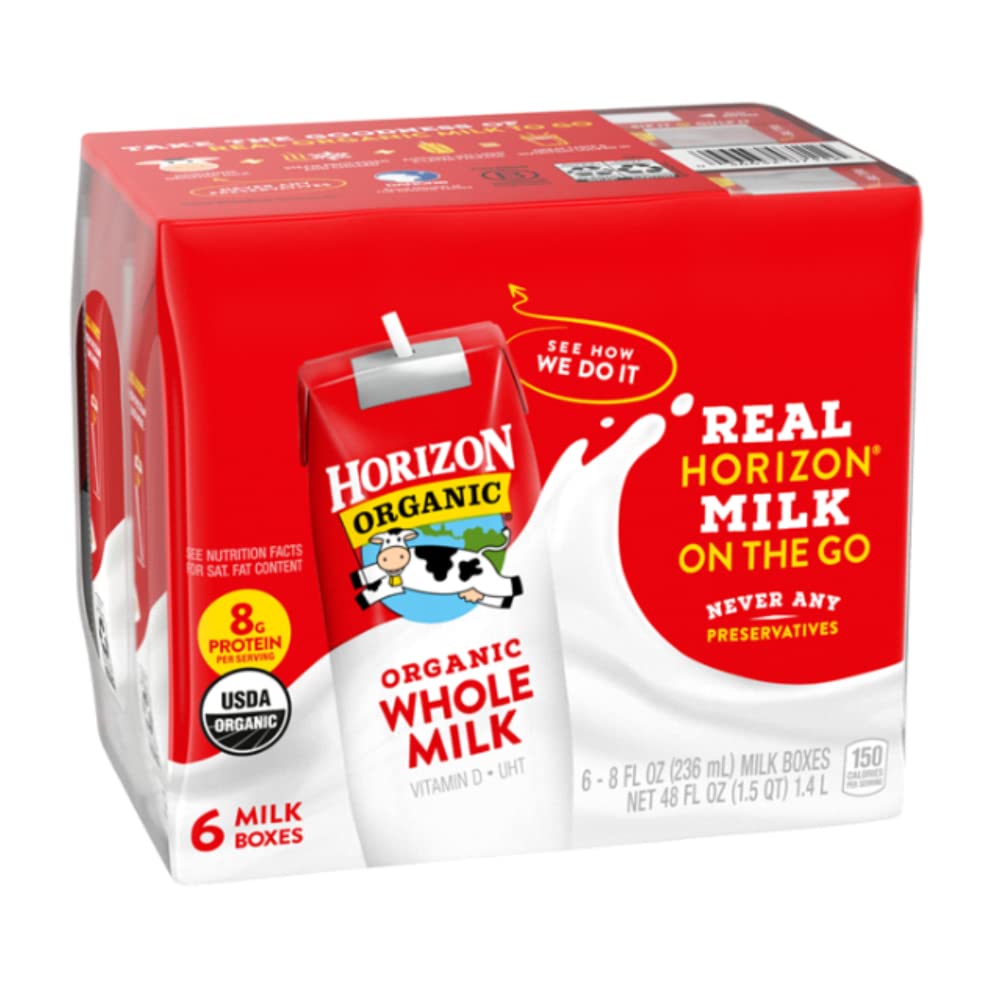
Dairy milk is a great option for protein in kids (assume they have no allergy or intolerance). Horizon is a great company for pre-packaged milk options, but most brands of milk will have similar nutrition profiles.
Your choice doesn’t necessarily have to be organic, especially if money is a concern (since organic is more expensive) but an organic option like Horizon will be as pure as possible. If your child wants something other than plain milk, horizon also offers low-fat chocolate and strawberry options.
Nutrition Facts: 150 Calories, 8g Fat, 13g Carbs (12g Sugar), 8g Protein
Key Ingredients & Nutritional Highlights: Organic Grade A milk, Vitamin D, Vitamin A. Each serving contains 8 grams of protein and is a good source of calcium and vitamins.
Pros and Cons: Horizon Organic Whole Milk is USDA Organic certified and free of high fructose corn syrup and artificial colors. However, it’s not suitable for children with lactose intolerance or milk allergy.
Fairlife DHA Omega-3 (formerly SuperKids)
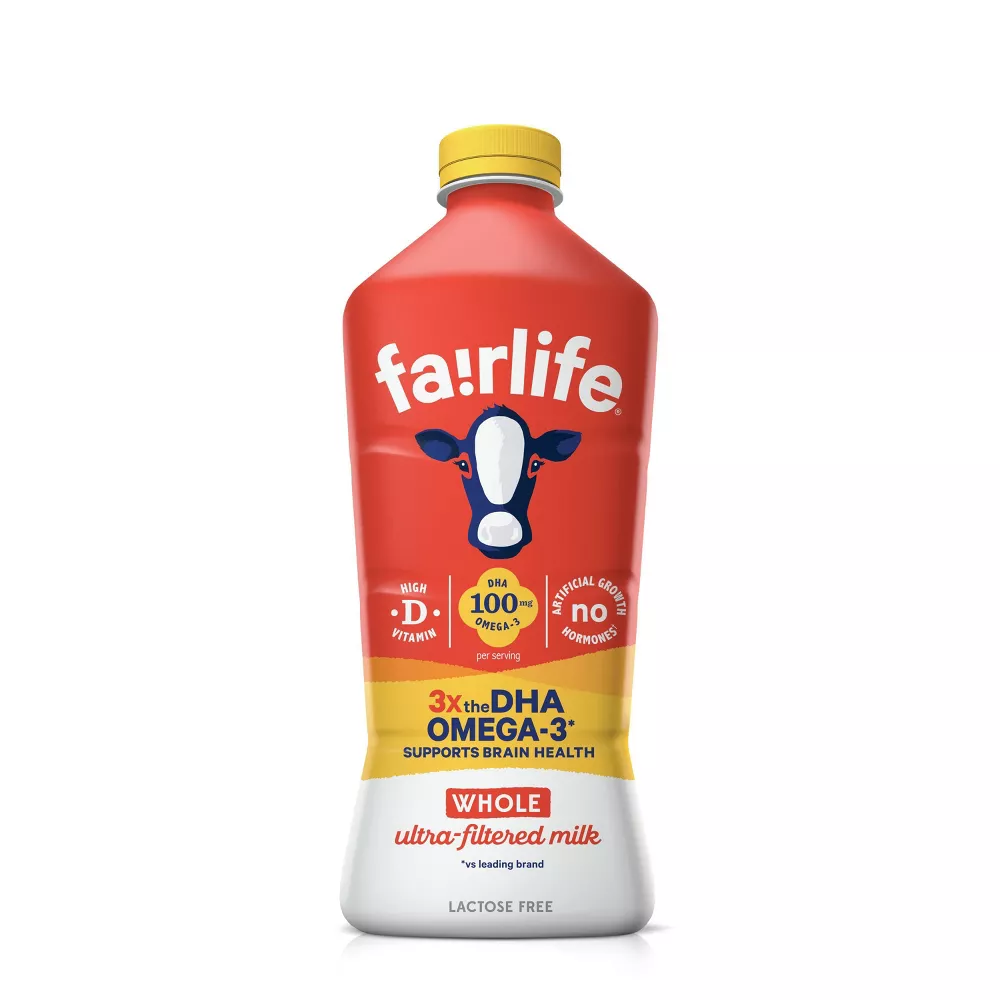
Fairlife milk is ultra-filtered, which produces more protein per cup than standard milk. While any Fairlife product is a great option for kid athletes, the extra omega-3s and vitamin D in this version are very beneficial for a child’s diet.
Fairlife does offer various flavors of their 2% milk, which is a great option for teen athletes looking for a bit more flavor in their life.
Nutrition Facts: 150 Calories, 8g Fat, 6g Carbs (6g Sugar), 12g Protein
Key Ingredients & Nutritional Highlights: Ultra-filtered milk, Vitamin D, DHA Omega-3. It offers 13g of high-quality protein per serving, plus added DHA for brain health.
Pros and Cons: This option offers a higher protein content than regular milk and has added Omega-3s, but it may not be suitable for those with dairy allergies or lactose intolerance.
Nesquik Chocolate Lowfat Milk
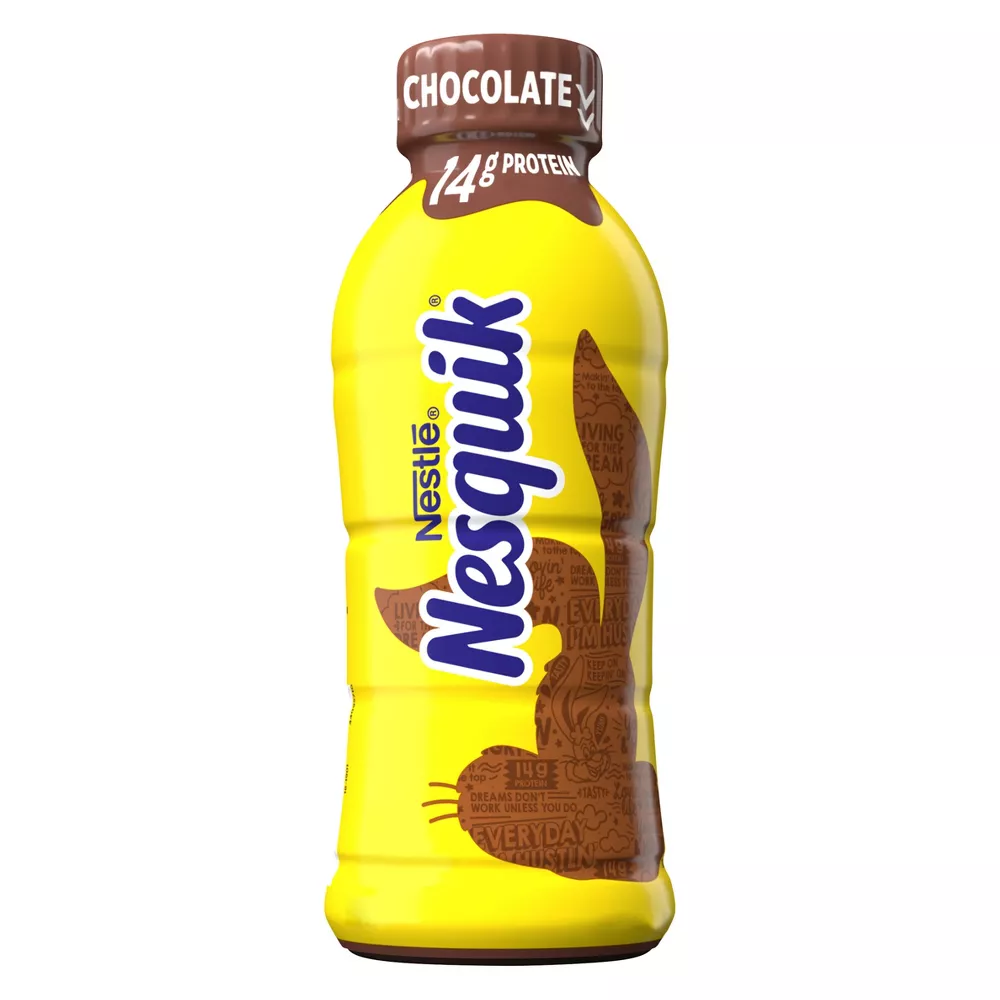
Nesquik has long been a favorite with kids, and it’s clear to see why: it’s delicious.
As a protein source, it may not be the best, but 14 grams is still a solid option for a kid’s diet. The high amount of sugar in Nesquik may be offputting for some, but when it comes to athletics, sugar is needed.
As long as the rest of their diet is balanced, the sugar in Nesquik will not be a problem, even if it is on the higher side.
Nutrition Facts: 250 Calories, 4g Fat, 41g Carbs (39g Sugar), 14g Protein
Key Ingredients & Nutritional Highlights: Low-fat milk, sugar, cocoa. Each serving delivers 8g of protein and essential nutrients like calcium and vitamin A.
Pros and Cons: It’s tasty and kid-approved, but it has added sugars and may not be suitable for children with dairy allergies.
PediaSure Sidekicks Protein Shake

Pediasure is a trusted brand in children’s nutrition, but I don’t particularly find this product super impressive. With the two main ingredients being water and added sugar, the ingredients don’t blow me away, but that doesn’t necessarily make it a bad option for a child’s protein needs, either.
If your child loves the taste of the vanilla, chocolate, or strawberry shake, it’s still a very good source of protein for their diet.
Nutrition Facts: 180 Calories, 6g Fat, 23g (3g Fiber &17g Sugar), 16g Protein
Key Ingredients & Nutritional Highlights: Milk protein concentrate, dietary fiber, essential vitamins, and minerals. Each serving provides 10g of protein.
Pros and Cons: It’s a complete, balanced nutrition option for kids, but high in sugar compared to other options.
Grow Daily Protein Powder
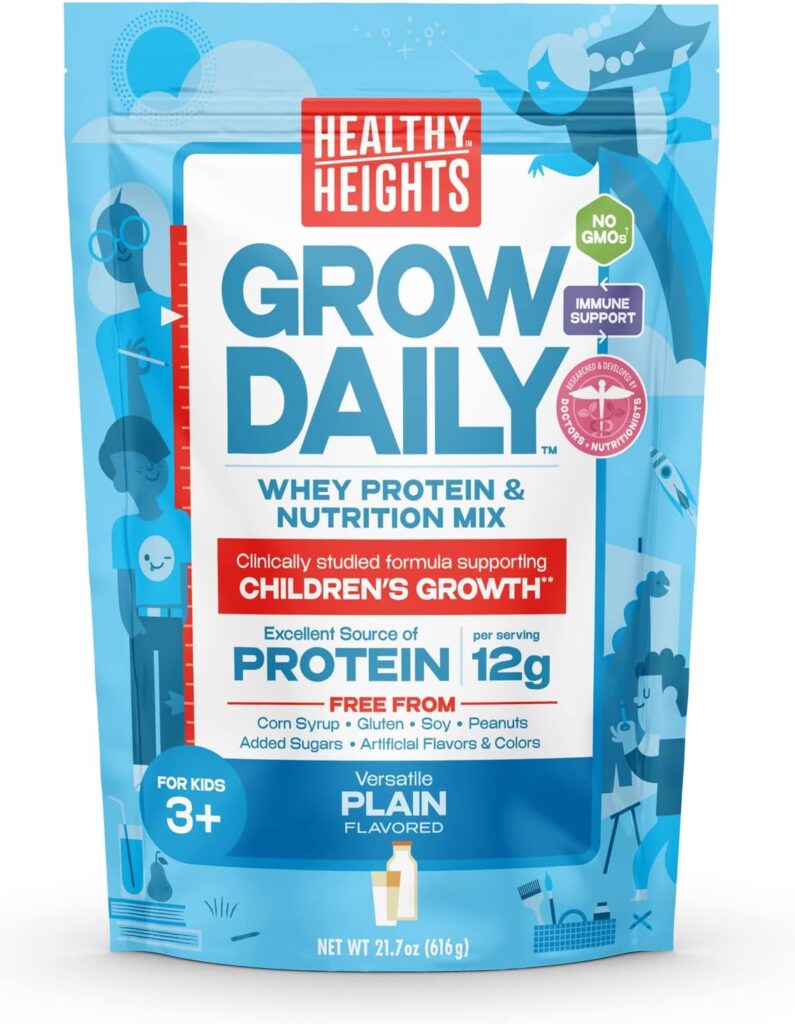
Offered in both vanilla and chocolate, this seems like a pretty straightforward whey protein, but it is rather expensive compared to other options.
But with immune support and vitamins to aid children’s growth, if your child ends up loving the taste, it’ll be worth it.
Nutrition Facts: 180 Calories, 5g Fat, 22g Carbs (9g Sugar), 12g Protein
Key Ingredients & Nutritional Highlights: Whey protein, casein protein, vitamins, and minerals. It contains 12g of protein per serving.
Pros and Cons: This powder offers high-quality protein and is available in kid-friendly flavors. However, it’s rather expensive.
Carnation Breakfast Essentials High-Protein
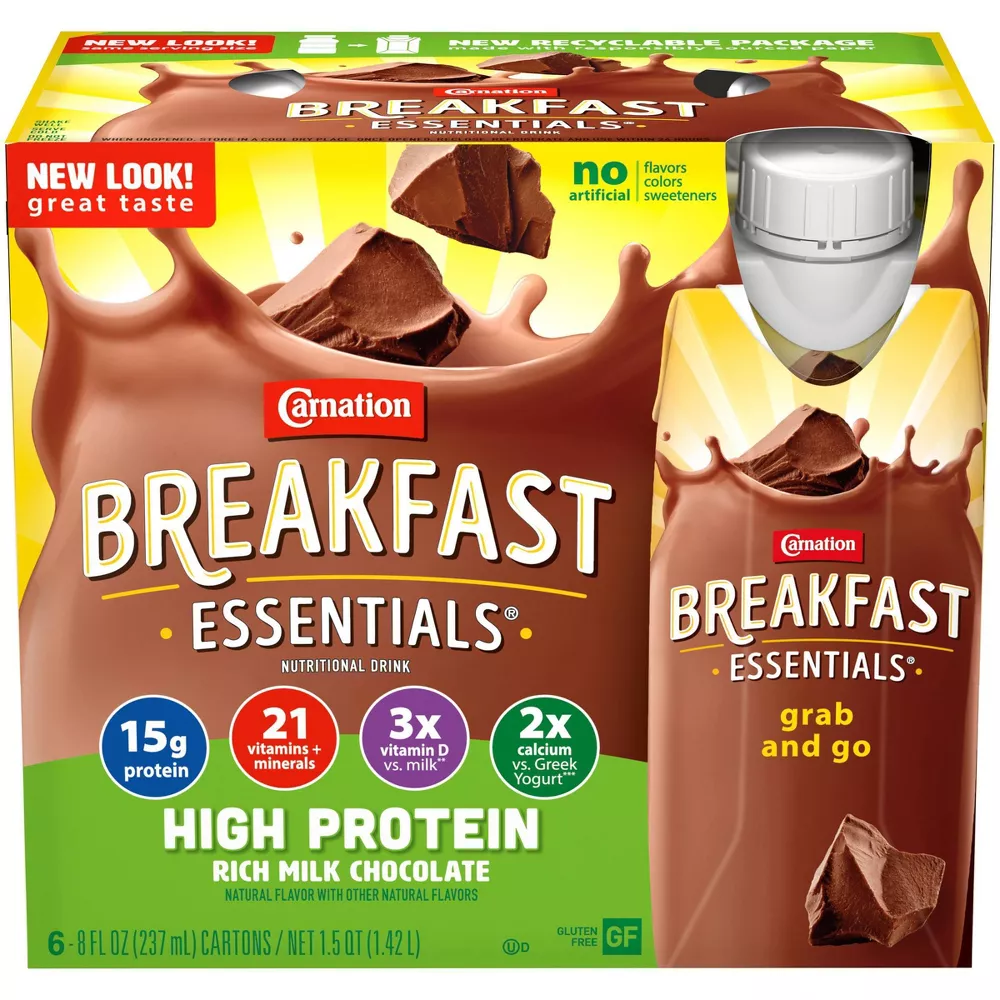
Carnation is a very recognizable brand in the dairy space, so it’s no surprise that they make some of the best pre-made shakes out there for kids.
According to Amazon reviews, most kids love these, and they are a great option for kids needing protein and calories in their lives. With 12 grams of sugar, it will also help provide energy around sports when it is needed most.
Nutrition Facts: 220 Calories, 6g Fat, 27g Carbs (12g Sugar), 15g Protein
Key Ingredients & Nutritional Highlights: Nonfat milk, whey protein concentrate, vitamins, and minerals. Each serving offers 18g of protein.
Pros and Cons: It’s a convenient breakfast replacement with high protein content. However, it contains some artificial flavors.
Boost Kid Essentials Shakes
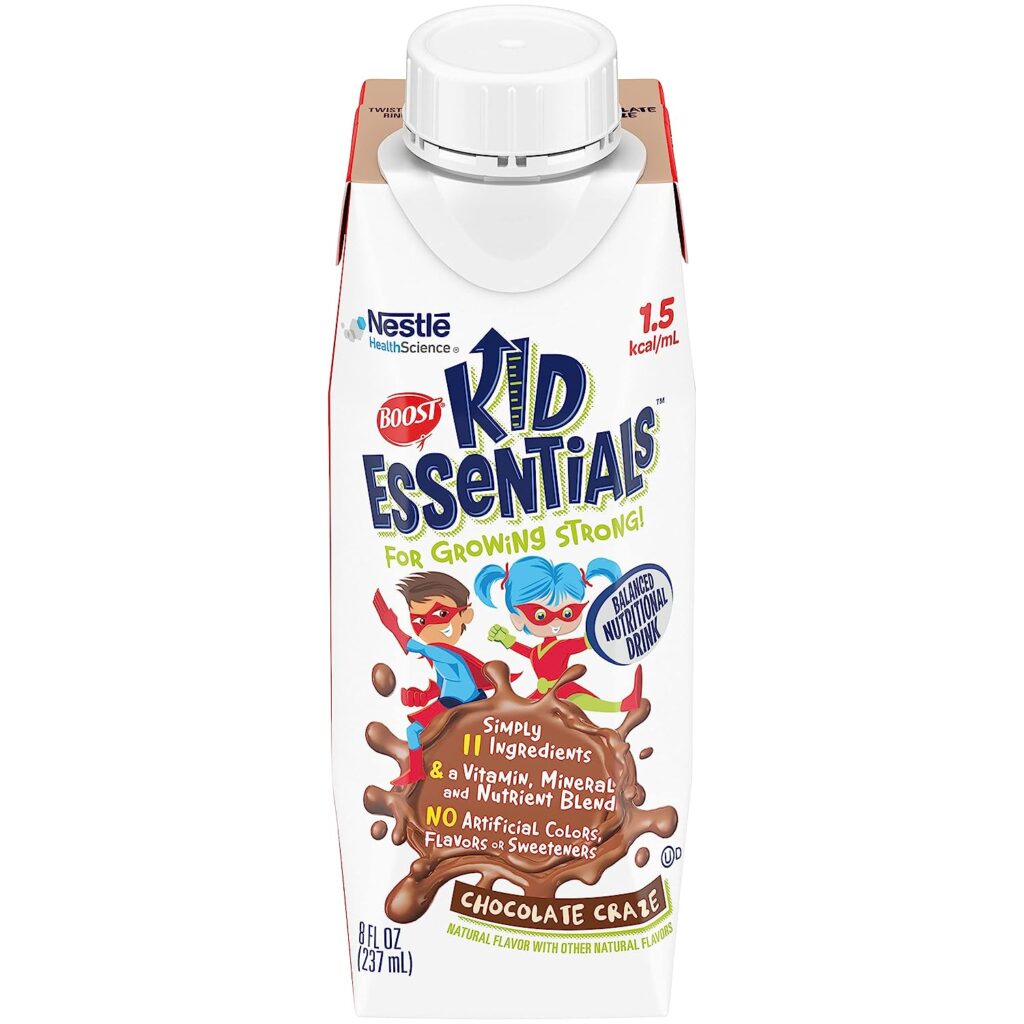
Boost is on the higher side in terms of calories and fat, so it’s an ideal option if your child is struggling to eat enough. If your little one needs assistance with weight gain, a shake like this that is packed with healthy fats would prove beneficial.
As a protein source for athletics, it would not be my top choice due to the high fat and lower protein. But as a meal replacement, it could be extremely beneficial. Still, it’s one of the more expensive options out there, so it may not become a staple.
Nutrition Facts: 360 Calories, 18g Fat, 39g Carbs (9g Sugar), 10g Protein
Key Ingredients & Nutritional Highlights: Milk protein concentrate, vitamins, and minerals. Each shake provides 10g of protein.
Pros and Cons: These shakes are nutritionally complete and come in kid-friendly flavors. However, they are higher in calories and fat and will depend on your child’s needs.
Nurished Mighty Chocolate Milk
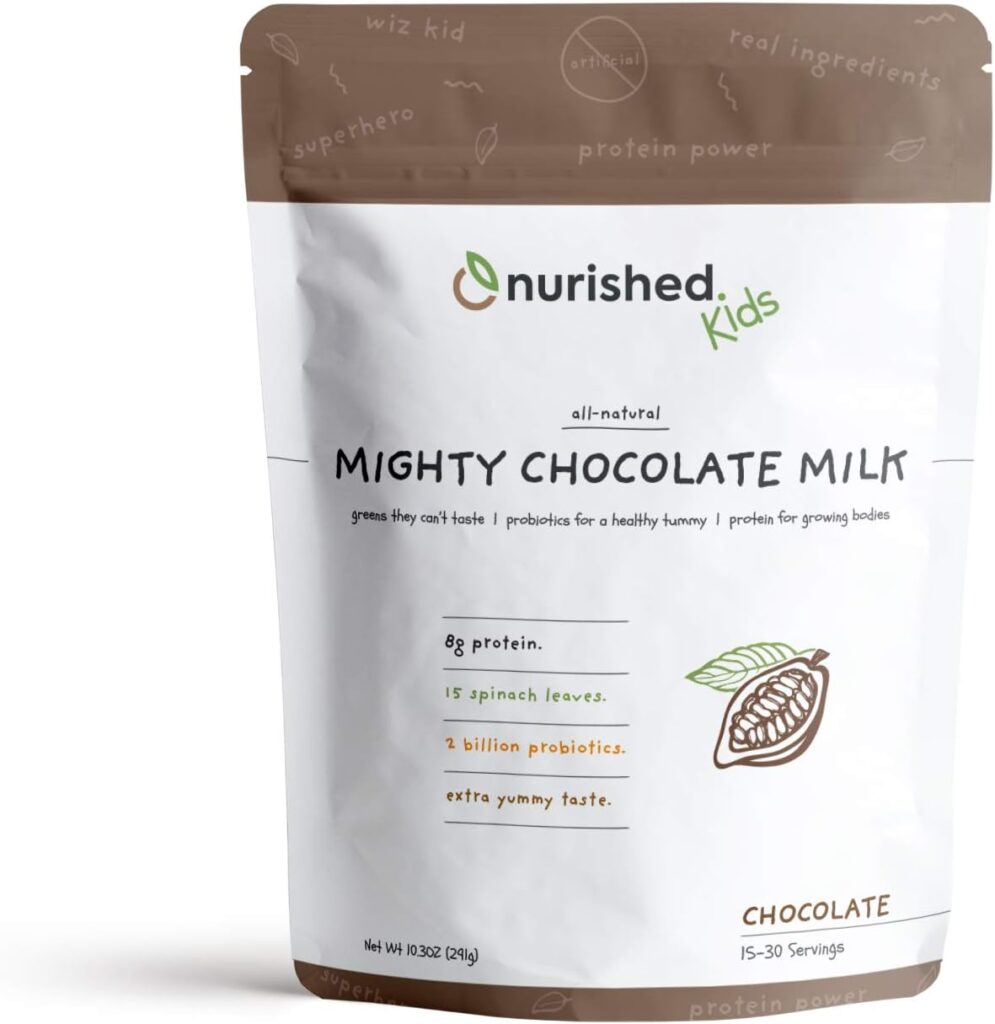
If you have a little one that’s very picky, this powder can help get some extra protein into their diet if you’re having a hard time.
It’s packed with nutrients from whole foods and probiotics, making it a great overall option. The only potential downside is that it does contain sugar alcohol, which some parents may not love for their kids. The sugar alcohol is stevia, which I am personally fine with, but each person is different.
Nutrition Facts: 45 Calories, 0.5g Fat, 5g Carbs (0g Sugar), 8g Protein
Key Ingredients & Nutritional Highlights: Whey protein concentrate, organic cane sugar, probiotics, and superfoods. It offers 8g of protein per serving.
Pros and Cons: This protein powder includes probiotics for gut health, but it does contain sugar alcohol that some parents may not be fond of.
Nutrikid Protein Powder
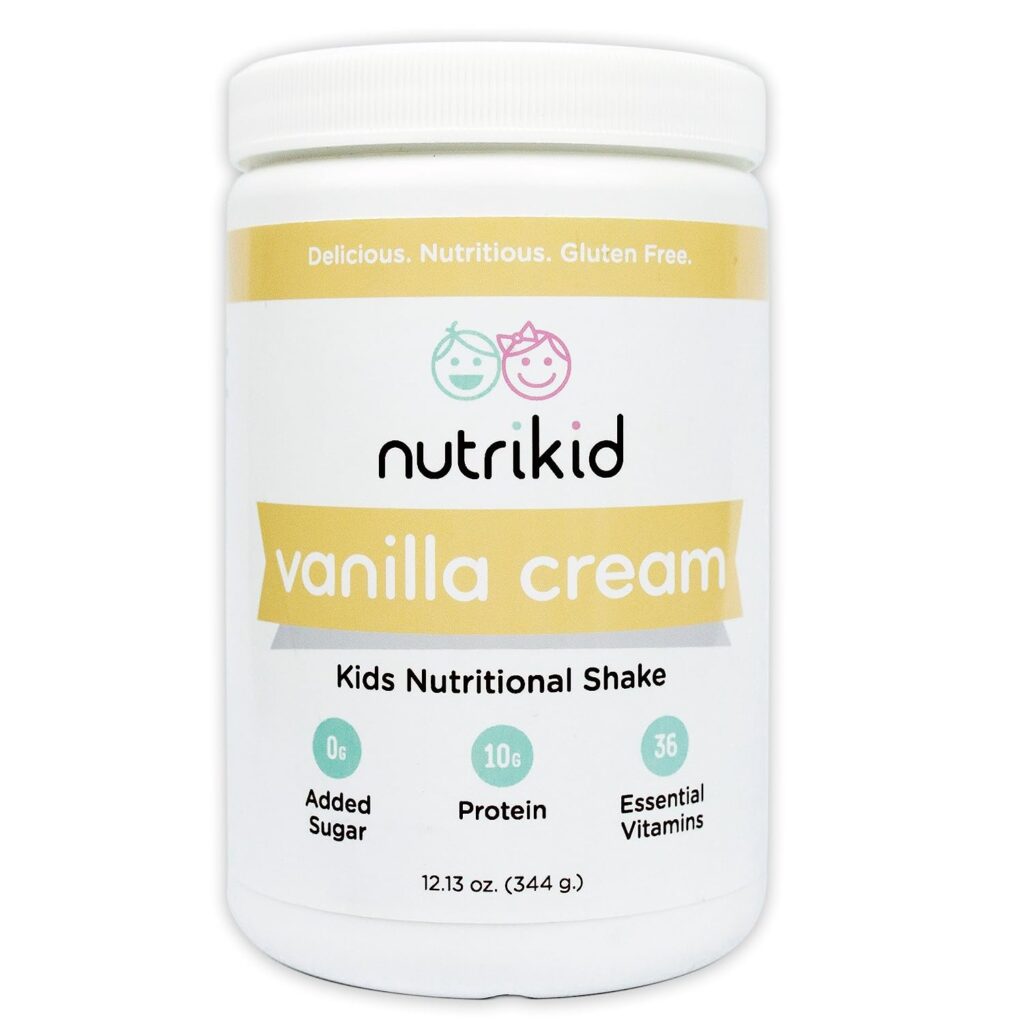
This powder comes in chocolate and vanilla, but they also offer an orange cream flavor which is unique to see in kids’ shakes. With the very long list of nutrients, this is definitely an option geared toward picky eaters.
It’s not very high in calories, so you’ll want to mix this into another drink or food (like a smoothie or oatmeal) to make sure your picky eater is getting enough calories.
Nutrition Facts: 86 Calories, 1.75g Fat, 8g Carbs (2.5g Sugar), 10g Protein
Key Ingredients & Nutritional Highlights: Whey protein isolate, digestive enzymes, vitamins, and minerals. It provides 10g of protein per serving.
Pros and Cons: Nutrikid offers high-quality protein and is easy to digest, but it’s not suitable for children with dairy allergies.
Other Delicious Sources of Protein for Children’s Diets
While protein shakes and powders are convenient and child-friendly, they’re not the only way for kids to get their protein. There’s a whole world of protein-rich foods out there, both vegan and non-vegan, that can appeal to even the pickiest of eaters. Here are some tasty options…
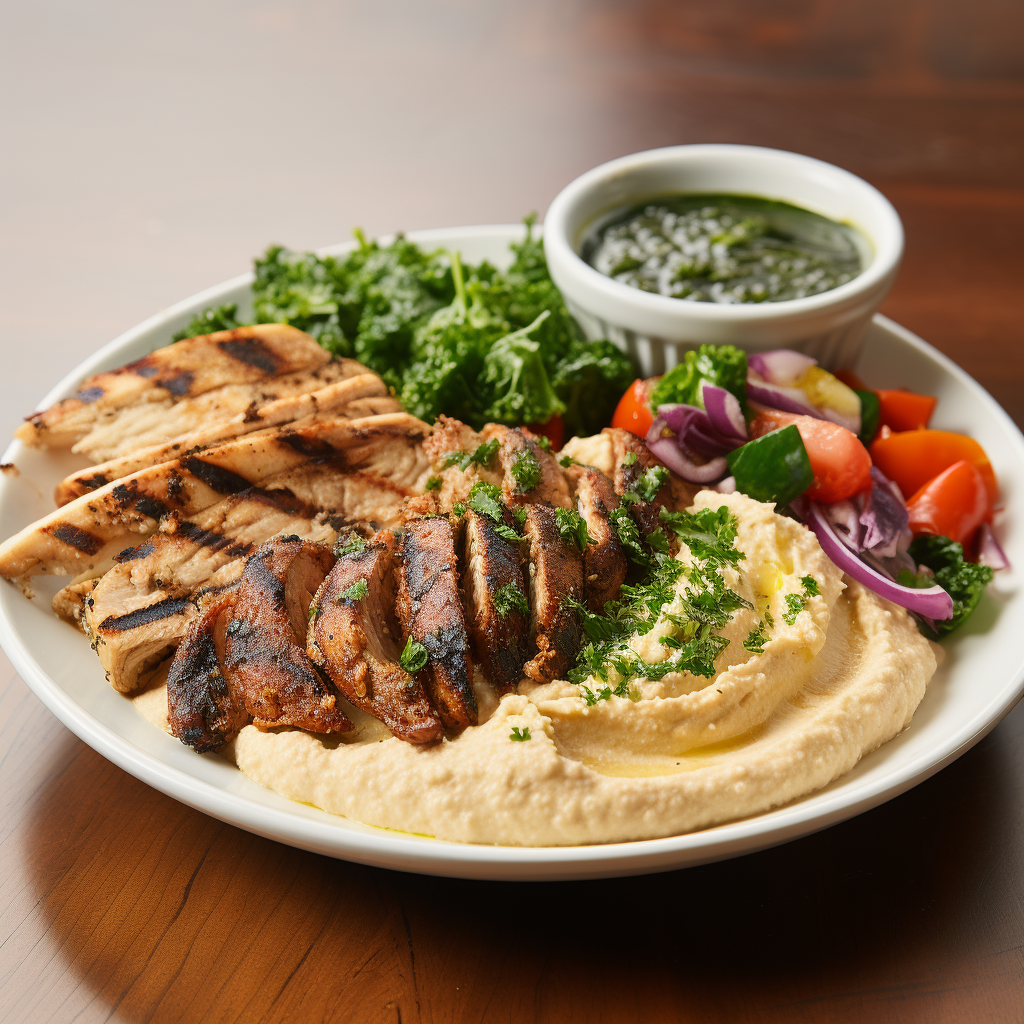
Non-Vegan Protein Sources:
- Chicken Nuggets: A favorite amongst most kids, you can also opt for homemade versions that are a bit healthier and just as tasty.
- Eggs: Scrambled, hard-boiled, or made into an omelet with cheese, eggs are versatile and easy to incorporate into meals.
- Cheese: Great on its own, in sandwiches, or melted over veggies, cheese is a reliable source of protein that kids typically love.
- Greek Yogurt: It’s more protein-dense than regular yogurt and can be jazzed up with honey or fresh fruits. Whole milk Greek yogurt will provide a ton of healthy fats as well.
- Turkey Roll-Ups: Slice of turkey wrapped around a cheese stick makes for a protein-packed snack that’s also fun to eat.
Vegan Protein Sources:
- Nut Butters: Slather almond or peanut butter on whole grain bread or mix into oatmeal for a protein boost.
- Hummus: This chickpea-based spread can be used in sandwiches or as a dip for veggies and crackers.
- Edamame: These fun-to-eat, sweet-tasting soybeans are a great source of complete plant protein.
- Quinoa: A high-protein grain, quinoa can be used in salads, as a side dish, or made into ‘quinoa porridge’ for breakfast.
- Black Bean Burgers: A tasty, kid-friendly dinner option, these can be made in batches and frozen for future meals.
By diversifying your child’s diet with these protein-rich foods, you’ll not only meet their protein needs but also introduce them to a variety of flavors and textures, helping them develop a healthy relationship with food.
As someone who grew up as an extremely picky eater, that is very important to me.
Remember, the aim is to create a balanced diet that includes all essential nutrients. Protein shakes and powders can play a part in this, but they should complement real foods, not replace them.
Wrapping Up: Making the Right Choice for Your Child’s Protein Needs
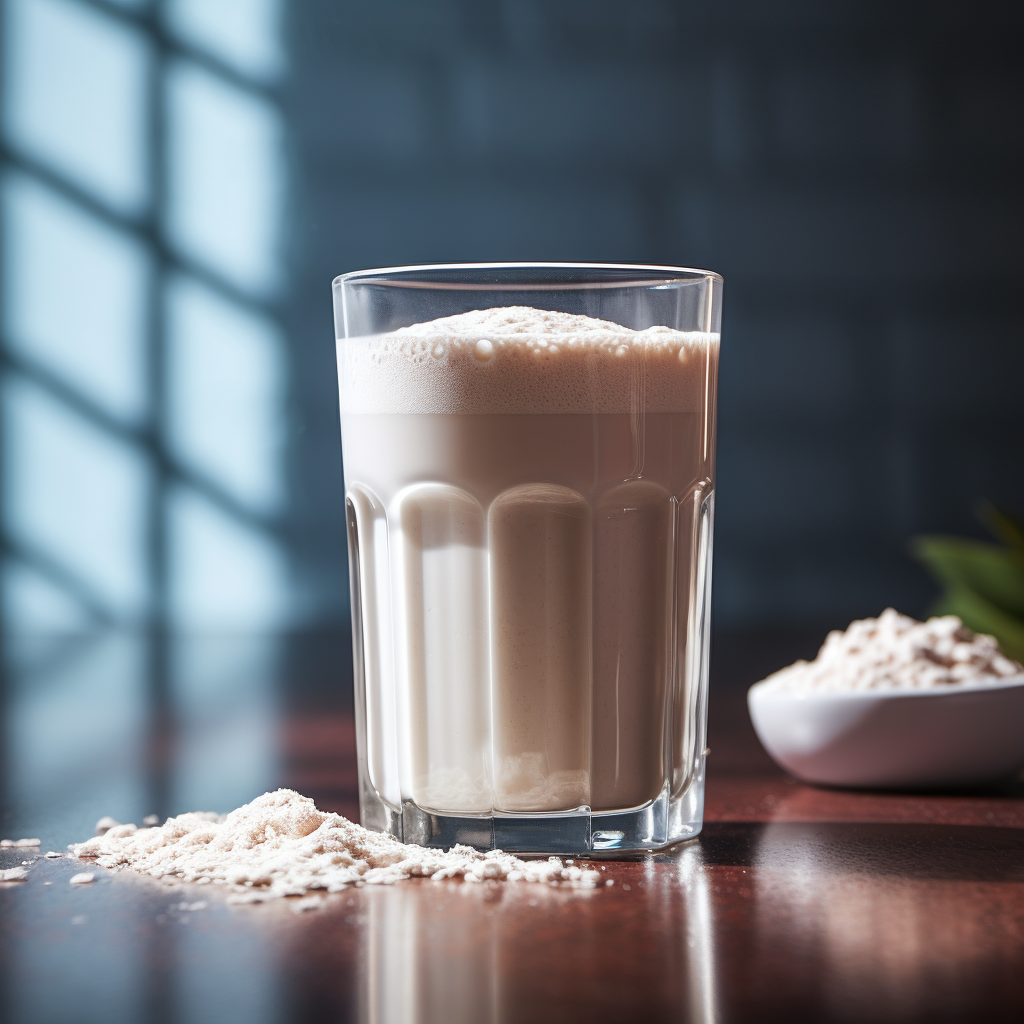
Finding the right protein shake or powder for your little one can make a big difference in their daily nutritional intake, especially for those budding athletes in need of an extra protein boost or for those finicky eaters who won’t even look at a piece of chicken.
But it’s important to remember: these shakes and powders should work in harmony with a diet filled with real, whole foods, not take their place.
When it comes to our kids’ health, we can never be too cautious or too informed.
That’s why it’s absolutely worth it to spend that little bit of extra time choosing a product made with wholesome ingredients that deliver the right balance of protein and other vital nutrients.
Maybe you’ll go for a tasty whey protein powder, or perhaps a plant-based or vegan formula is the right choice for your family. Either way, you’re making a responsible decision to support your child’s growth, development, and overall well-being.
I’m eager to hear from fellow parents navigating these same choices. Have you given any of these protein shakes or powders a try?
I haven’t tried most of these myself, so my thoughts can only go as far as what the ingredients and nutrition facts tell me. I’d love to hear from you!
